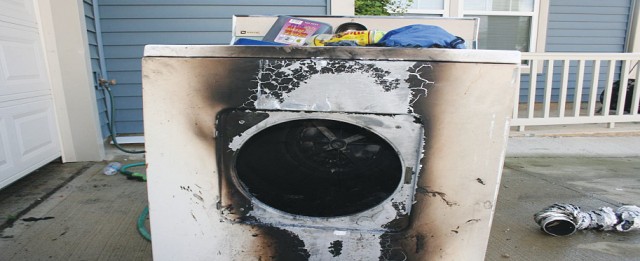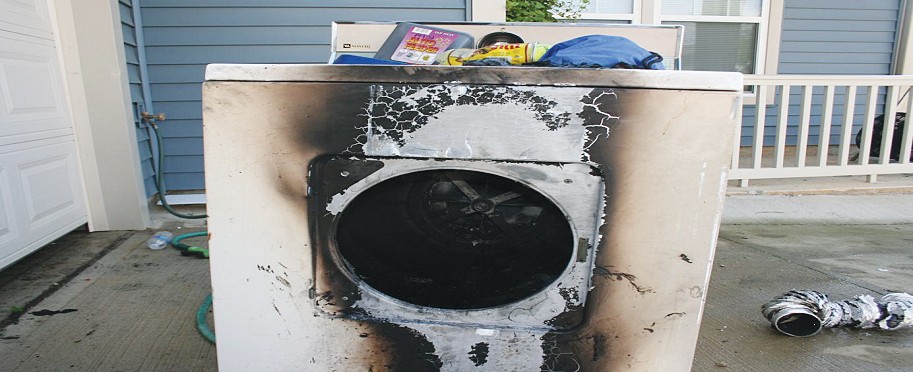FORT BENNING, Ga. - Officials have a message for post residents: Dryers could do more than simply take the dampness out of your clothes if they're not maintained properly.
Three small dryer fires, including one at Smith Fitness Center, have broken out at Fort Benning in the last few months, said Steven Lowell, the installation's assistant chief of fire prevention. All were directly tied to a buildup of lint in the exhaust tube and area surrounding the dryer itself.
"All the fires were confined to the clothes dryer itself. This was due to the occupant being home and the response of our emergency forces," he said. "The (damages) have been estimated at under $1,000."
But as a result, The Villages of Benning and Fort Benning Fire Prevention are teaming up to heighten awareness for Soldiers and families and help reduce the risks.
In 2006, an estimated 17,700 home structure fires involving clothes dryers or washing machines were reported in the U.S., according to the National Fire Protection Association. They resulted in 15 deaths, 360 injuries and $194 million in property damage.
The NFPA also states that dryers and washing machines were to blame for one out of every 23 home structure fires reported to U.S. fire departments between 2003 and 2006.
"Any fire unchecked has the potential to expand and cause significant damage to personnel, property and the environment," Lowell said. "It only takes two minutes for a small couch fire to grow and affect the whole living room."
The leading cause of home clothes dryer and washer fires is failure to clean (29 percent), followed by unclassified mechanical failure or malfunction (24 percent), according to the NFPA. Thirteen percent are caused by some type of electrical failure or short circuit.
The Villages of Benning will now conduct biannual maintenance and again during changes of occupancy to clean out lint and sweep the dryer ducts, officials said.
If post residents are having issues with dryer lint or notice the machine is not working properly, they should call maintenance at 706-685-3929.
FAST FACTS
Aca,!Ac Clothes dryer fires account for about 15,600 structure fires, 15 deaths and 400 injuries annually.
Aca,!Ac Eighty percent of clothes dryer fires in structures occur in residential buildings.
Aca,!Ac Annually, 12,700 clothes dryer fires occur in residential buildings, resulting in 15 deaths and 300 injuries.
Aca,!Ac "Failure to clean" is the leading factor contributing to clothes dryer fires in residential buildings.
Aca,!Ac New home construction trends place clothes dryers and washing machines in more hazardous locations - away from outside walls - such as bedrooms, second-floor hallways, bathrooms and kitchens.
Source: U.S. Fire Administration
SAFETY TIPS TO PREVENT A DRYER FIRE
Aca,!Ac Have your dryer installed and serviced by a professional.
Aca,!Ac Do not use the dryer without a lint filter.
Aca,!Ac Make sure you clean the lint filter before or after each load of laundry. Remove lint that has collected around the drum.
Aca,!Ac Rigid or flexible metal venting material should be used to sustain proper airflow and drying time.
Aca,!Ac Make sure the air exhaust vent pipe is not restricted and the outdoor vent flap will open when the dryer is operating. Once a year, or more often if you notice it's taking longer than normal for your clothes to dry, clean lint out of the vent pipe or have a dryer lint removal service do it for you.
Aca,!Ac Keep dryers in good worker order. Gas dryers should be inspected by a professional to make sure the gas line and connection are intact and free of leaks.
Aca,!Ac Make sure the right plug and outlet are used and the machine is connected properly.
Aca,!Ac Follow the manufacturer's operating instructions and don't overload your dryer.
Aca,!Ac Turn the dryer off if you leave home or when you go to bed.
And don't forget...
Aca,!Ac Dryers should be properly grounded.
Aca,!Ac Keep the area around your dryer clear of things that can burn, such as boxes, cleaning supplies and clothing.
Aca,!Ac Clothes that have come in contact with flammable substances such as gasoline, paint thinner or similar solvents should be laid outside to dry. Then, they can be washed and dried as usual.
Source: National Fire Protection Association


Social Sharing